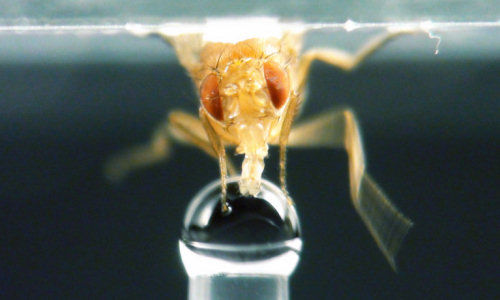Scientists discover previously unknown thermal sensor in insects linked to taste, smell.Call it the Goldilocks Principle — animals can survive and reproduce only if the temperature is just right. Too hot and they will overheat. Too cold and they will freeze.
To stay in their comfort zone, animals have evolved very sensitive temperature sensors to detect the relatively narrow margin in which they can survive. Until recently, scientists knew little about how these sensors operated.
Now, a team of Brandeis University scientists has discovered a previously unknown molecular temperature sensor in fruit flies belonging to a protein family responsible for sensing tastes and smells. These types of sensors are present in disease-spreading insects like mosquitoes and tsetse flies and may help scientists better understand how insects target warm-blooded prey — like humans — and spread disease.
The discovery is published in the advance online edition of the journal Nature.
Biting insects, such as mosquitoes, are attracted to carbon dioxide and heat. Notice how mosquitoes always seem to bite where there is the most blood? That is because those areas are the warmest, says Paul Garrity, a professor of biology in the National Center for Behavioral Genomics at Brandeis who co-authored the paper.
“If you can find a mosquito’s temperature receptor, you can potentially produce a more effective repellent or trap,” Garrity says. “The discovery of this new temperature receptor in the fruit fly gives scientists an idea of where to look for similar receptors in the mosquito and in other insects.”
Professor of Biology Leslie Griffith and Associate Professor of Biochemistry Douglas Theobald assisted with the research, which was led by postdoctoral fellows Lina Ni and Peter Bronk.
The newly discovered sensor belongs to a family of proteins, called gustatory receptors, that have been studied for over a decade but never linked to thermosensation, Garrity says. In previous studies, other gustatory receptors have been found to allow insects to smell carbon dioxide and to taste sugar and bitter chemicals like caffeine.
But in fruit flies, one type of gustatory receptor senses heat rather than smell or taste. This receptor, known as Gr28b, is responsible for sensing external temperatures and triggering a quick response if temperatures exceed the fly’s Goldilocks zone, Garrity and his team discovered.
The research also reconciles previously conflicting views of how a fruit fly senses warmth, by showing that the insect has distinct external and internal systems for thermal detection.
Related systems are likely present in other insects, including those that spread diseases like malaria and sleeping sickness that kill hundreds of thousands annually. The more scientists understand about how insects respond to and sense heat, the better they can understand insect migration in response to rising global temperatures and the spread of disease through insect bites.
“This research reveals a new way in which animals detect temperature,” Garrity says. “It’s important because heat detection is critical for the behavior of insects that spread disease, kill crops and impact the environment.”
Story Source:
The above story is based on materials provided by SBrandeis University, Debra Filcman and Leah Burrows.





